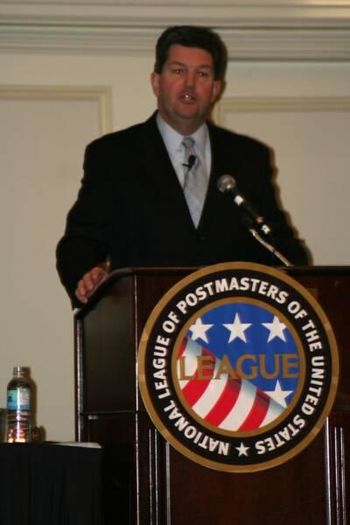UnNews:Postal Service to be replaced by Pony Express
13 June 2012
WASHINGTON, DC – Postmaster General Patrick Donahue warned Americans that they may be reduced to using email, instant messaging, social utility services such as Facebook and MySpace, cellular telephones, and private freight- and package-delivery companies such as FedEx and UPS to communicate, rather than depending upon the United States Postal Service to deliver mail and parcels, “unless the government hands us a bailout.”
The beleaguered Postal Service is $3.2 billion in debt, and that's in only the first quarter of the new fiscal year. “We have two or three choices,” Donahue said, “if we don't get a massive, taxpayer-supported bailout: (a) fire a bunch of civil servants—in this case, postal workers—(2) cut services, and/or (c) both.”
Critics of the Postal Service suggested a third (or a fourth, depending upon how one counts) possibility: start delivering mail by Pony Express.
“It worked before, and it could work again,” freight transportation tycoon Alexander Majors declared.
The original Pony Express delivered mail from St. Louis to Sacramento, crossing the Great Plains, the Rocky Mountains, and the High Sierra, often while riders fought off attacks by crazed savages redskins Indians Native Americans.
According to historians, the fabled mail delivery system succumbed to technological advances, much as the present-day Postal Service is being made obsolete by computerized and digital media. “It couldn't compete with the transcontinental telegraph and the transcontinental railroad,” Drake Edwards, a communications professor at ITT Technical Institute, said. He believed that a modern resurrection of the Pony Express would not last much longer than the original outfit lasted, which was about 18 months, “or about as long as the United Postal Service has left.”
Ironically, the Pony Express earned $90,000 but cost $200,000 to operate, so that, when it was discontinued, the operation had lost $110,000. “Delivering love letters and bills had about as much commercial success then as it does now,” Edwards observed. “No wonder the Postal Service is going broke.”
“We're not 'going broke,'” the Postmaster General disagreed with Edwards' assessment, “not yet, anyway, but we will—if Uncle Sam doesn't do the right thing and give us a bailout. We deserve it just as much as Solyndra, GM, the banks, and the other incompetent companies in the private sector, and we're too big for our britches to fail, too.”
Edwards' prediction that the Pony Express will replace the Postal Service caused a commotion on Wall Street. Stocks rallied briefly, before succumbing to the stagnation that has become typical of the market since the election of Barack Obama in 2008.
Unfazed by Edwards' prediction, Donahue announced that, starting in January, 2013, “if the Post Office is still around,” First-Class postage stamps will increase from forty-two cents to “$101.85.”
Each.
